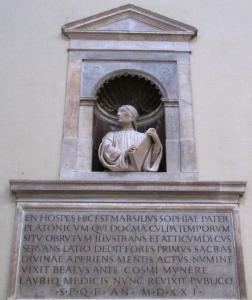
God is the source and foundation of every good. “Every good endowment and every perfect gift is from above, coming down from the Father of lights with whom there is no variation or shadow due to change” (Jas. 1:17 RSV). Every created good, therefore, participates in and is united with the absolute good, the good which is found in God. This is because God, out of divine goodness, created the world and provided all that exists a way for them to participate in the absolute good for themselves. Where each of these goods are found, God is likewise to be found; through them, we can and should find God at work. Likewise, when we love them, we should find our love drawn up through them to God. Once our love has taken us up to God, through our love for God, we should find ourselves returning to created goods, and loving them because of the way their goodness connects them and unites them with God.
What is good is to be loved, but it is to be loved in such a way that the integral good is preserved; the more we love things in a sinful fashion, that is, in a disordered manner, in a way as if they possessed the good from themselves instead of seeing it is a good which connects them with every other good and with the absolute good itself. Sin, then, has us loving good things in a bad way, where we act and relate to them in a way which does not accord to their reality, and so in a way which undermines their nature. This is true, not only with things outside of ourselves, but also with ourselves: selfishness is wrong, not because we should not love ourselves, but because we should not love ourselves in the manner selfishness suggests we should, but rather, as if we are our own absolute good (turning ourselves into idols). All of this was understood by Marsilio Ficino, who, throughout his philosophical work, explored the concept of love. In a letter he addressed to his “fellow philosophers,” he said:
And to sum up, I would say, only that man is called a true and lawful lover who understands that in all good things which at every point are presented to him and please him, nothing truly pleases him but the divine good itself, from which and through which all things are good. Thus he loves himself in all, and cherishes all in himself, in such a way that he does not love himself, save in Him through whom he has that which makes him worthy of being loved. Indeed, he cares his utmost for all men, as created with him by the same father. But some he chooses before others, as being more like his father. With these he leads a heavenly life on earth and in heaven a life that is beyond the heavens. [1]
All things are to be loved because they are good, and so all people are to be loved because of the good in them. But all things, all people, are to be loved in proportion to the goodness within them as well as in the way they are united with the absolute good which comes from God. This does not mean things cannot change. They will change over time, and so the way we love them should change over time. As someone or something participates more and more in the absolute good, our love for them increase. But if someone should fall away, that is, if someone should do something to lessen the good in themselves, they are still to be loved by us because they still contain some good in them, and though they fall from the goodness which they once had, it is possible, thanks to our love, and the love others given to them, they might once again find their way back to where they once were, which is why it is important not to neglect them or cast them aside. And so, as Augustine understood, even though something falls away from the goodness which they once had, they can eventually be restored to it:
But the goodness of God does not permit a thing to be brought to this point. It disposes all things that fall away so that they occupy their place most suited to them until, by an ordered movement, they return to that from which they fell away.[2]
Thus, not only can we love someone for the good which is in them, but we can also love them for the potential they have, for the good which they might have, though of course, we must realize the distinction between the two. Since those who fall into sin, those who fail to actualize the good within them, still have good in them, and can be restored to the goodness which they once had, we must not use their fall as an excuse to ignore or mistreat them, saying because they are not as good as they once were, they should not be loved, and so, we do not need to treat them with kindness or respect. The fact that they exist and still possess good in them, even if it is less than it once was, means they should be loved, and if we had any question of this, all we should do is look to the way God loves everyone, helping all through that love to participate in the greater good and so become better. Through such love, through the embrace of every good, we can find ourselves then in a better state ourselves, which is why our life can be said to be a heavenly life here if we but embrace and love all that is good, for we will find it everywhere. Or, as St John of Krondstandt suggests, everything speaks of God, reflects God, to the lover of the good, so that all they experience is God in and through all things:
For him who truly believes in God, all material earthly things and all visible worlds, as it were, vanish; he cannot imagine a point of space without God; everywhere he contemplates the One Infinite Being – God. He represents to himself that with every breath of air he breathes God; for him the Lord is everywhere and in everything, and creatures as though they did not exist, while he himself willingly vanishes mentally in order to give place also in himself to the one God, Who alone is, and Who works within him in everything.[3]
Or, it be said, God is the true light, and all things are revealed in the light of God, the light which itself is all-good and shares with everything its goodness so that all things, like the moon to the sun, participate in and reflect that light in various ways. This shows us how we are to distinguish God from the rest of creation creating an absolute division between the two. God alone is the true light, and the light of everything else is a reflection of God’s light, so that God has no partner in the creation of that light “It will be unveiled to you, when the degrees of these lights become manifest, that God is the highest and furthest light, and, when their realities become unveiled, that He is the real, true light – He alone, without any partner in that.” [4] And so, once again, we see the goodness of God is found in all things as a gift of God, something which flows from God and is shared with the rest of creation. “Therefore, all things, to the extent that they are, are the outpouring and the overflowing of this first, most pure and most abundant source. For this reason many of the nobler philosophers have held that all things are good, insofar as they flow down from the most pure spring of being (essendi).”[5] This provides the distinction which we need in order to make sure we do not turn created things into idols while not neglecting to love them the way we should. But it also explains how our life, even now, can be one which participates in the kingdom of God, to be, that is, heavenly, for insofar as we encounter and experience the glory of God, we experience the kingdom of God, seeing it truly is at hand. Thus, as we love all things for the good in them, so we can see the work of God in all creation, and truly find ourselves attaining that purity of heart which is needed in order to see God. Loving everything therefore has as love God, and in that love of God, experience the glory of God, while neglecting that love, thus, only threatens to hide the kingdom of God from ourselves, and so throw us further and further into the darkness and the pain and sorrow which can be had in it.
[1] Marsilio Ficino, The Letters of Marsilio Ficino. Volume 3 {Liber IV]. trans. by members of the Language Department of the School of Economic Science, London (London: Shepheard-Walwyn, 195), 67 [Letter 32 to his fellow philosophers, especially Ermolao Barbaro].
[2] St. Augustine, “The Way of Life of the Manichaeans” in The Catholic and Manichaen Ways of Life. Trans. Donald a. Gallagher and Idella J. Gallagher (Washington, DC: CUA Press, 1963), 71.
[3] St John of Kronstadt, My Life in Christ. Trans. E.E. Goulaeff (London: Cassel and Company, Ltd., 1897; repr. Jordanville, NY: Holy Trinity Monastery, 2000), 108.
[4] Al-Ghazālī, The Niche of Lights. Trans. David Buchman (Provo, UT: Brigham Young University Press, 1998), 6.
[5] William of Auvergne, The Trinity, Or The First Principles. Trans. Roland J. Teske, SJ and Francis C. Wade, SJ (Milwaukee: Marquette University Press, 1989), 80.
Stay in touch! Like A Little Bit of Nothing on Facebook.
If you liked what you read, please consider sharing it with your friends and family!













